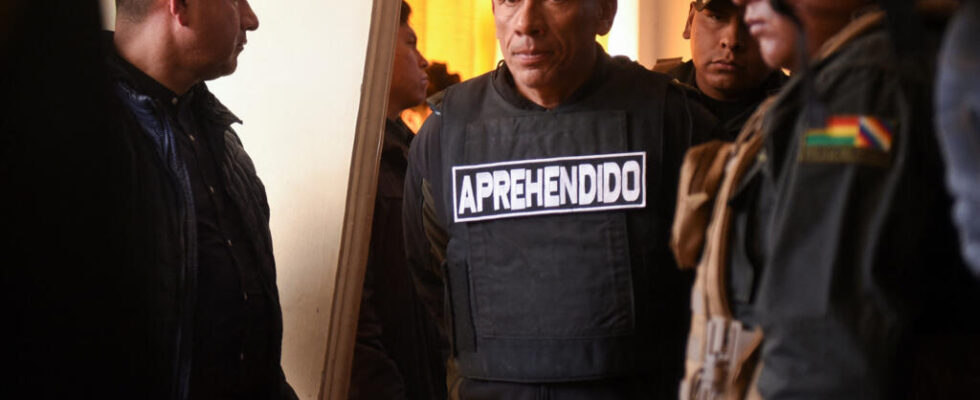Bolivian authorities paraded handcuffed detainees before the media on Thursday, announcing 17 arrests in the wake of a failed coup in a country gripped by a severe economic crisis.
4 mins
There institutional storm blew only a few hoursbut enough to reveal the fragilities of the Bolivia as appetites for the 2025 presidential election are whetted.
The motivations of army chief Juan José Zúñiga, who had installed men and armored vehicles in Murillo Square, opposite the Parliament and the presidential palace, remain unclear. Before his arrest by the police, then that of the head of the Navy Juan Arnez Salvador, General Zúñiga had said he wanted “ to restructure democracy, to make it a real democracy […]. Not that of a few, not that of a few masters who have ruled the country for 30 or 40 years “But during his arrest, he also claimed to have acted on the orders of the head of state who had asked him to ” to stage something to increase its popularity “.
15 other people arrested
President Arce, demoting General Zúñiga and swearing in a new command of the armed forces on Wednesday, affirmed on the contrary that it is a ” attempted coup d’état by soldiers who soil the uniform “. His Interior Minister, Eduardo Del Castillo, castigated “ two military putschists who wanted to destroy democracy “.
On Thursday, he presented to the media 15 other people arrested, handcuffed, surrounded by police officers. This operation had been planned since May “, he said, adding that three other suspects were wanted. According to Mr. del Castillo, the plan to oust Mr. Arce “ was led by Mr. Zúñiga and Mr. Arnez “.
Bolivian President Luis Arce later denied conspiring with General Juan José Zúñiga. How could one order or plan a self-coup? […] ? He acted on his own initiative “, Luis Arce told the press.
The United Nations on Thursday called for ” a thorough and impartial investigation into allegations of violence “.
Although the institutional order has only slightly wavered, strong images remain. That of a door to the presidential palace forced by an armoured vehicle and the entry into the crowd of General Zúñiga, the securing of the square and the firing of tear gas by the military, injuring eight people, and the images of the conversation between Luis Arce and General Zúñiga, broadcast by the presidency. I am your captain […] bring all the military police back to their barracks […]withdraw all these forces now. This is a general order, you are not going to listen to me ? », then reprimands President Arce. The general looks at him and responds with a “ No » categorical.
After the withdrawal of the military from Murillo Square, President Arce appeared on the balcony of the presidential palace to greet the crowd that had gathered there. No one can take away the democracy we have won. ” he chanted.
A tense economic and political situation in Bolivia
This episode comes in a context of strong economic turbulence caused by the fall in revenues due to the low production of gas, its main source of foreign currency until 2023, a surge in prices and a scarcity of dollars, provoking the anger of traders of all kinds, while a fuel shortage stretches the queues in front of gas stations.
And above all, in the background is the conflict between Luis Arce and his political mentor, former President Evo Morales (2006-2019), both eager to run on behalf of the ruling party, the Movement Toward Socialism (MAS), in the 2025 presidential election. General Zúñiga had expressed his firm opposition to a possible return to power of Mr. Morales, who enjoys strong support throughout the country, but who according to a decision of the Constitutional Court cannot compete.
Read alsoBolivia: “There is real dissatisfaction within society,” according to political scientist Gaspard Estrada
Condemnations of General Zúñiga’s actions have poured in from all South American countries, but also from Spain, France and the United States. Russia, which had received Luis Arce, a rare visit by a foreign head of state to the country since the outbreak of the conflict with Ukraine in February 2022, stressed on Thursday its “ solidarity with Bolivia, a brother country and a reliable and strategic partner “, according to Russian Foreign Minister Sergei Lavrov. Russian presidential spokesman Dmitry Peskov warned against any “ interference » foreign in the internal affairs of Bolivia.
